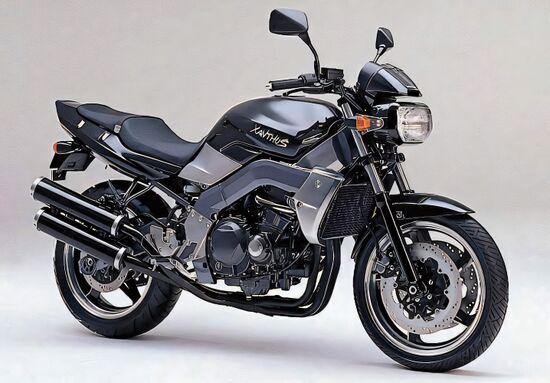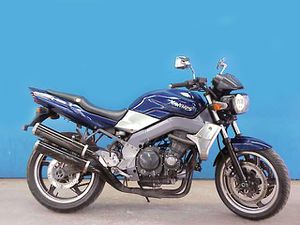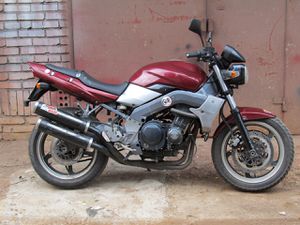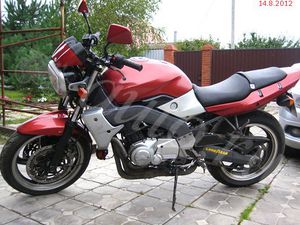Difference between revisions of "Kawasaki Xanthus 400"
m |
m |
||
| (One intermediate revision by the same user not shown) | |||
| Line 1: | Line 1: | ||
{{DISPLAYTITLE: Kawasaki Xanthus 400 (ZR400D)}} | {{DISPLAYTITLE: Kawasaki Xanthus 400 (ZR400D)}} | ||
| + | {{#seo: | ||
| + | |keywords={{PAGENAME}}, review, specs, owners manual, service manual, guide | ||
| + | |og:image=https://en.enduro.team/images/e/ef/Zr-400-xanthus_1992_1.jpg | ||
| + | }} | ||
__notoc__ | __notoc__ | ||
| − | |||
[[file: Zr-400-xanthus 1992 1.jpg | 550px | center | Kawasaki Xanthus 400 (ZR400D)]] | [[file: Zr-400-xanthus 1992 1.jpg | 550px | center | Kawasaki Xanthus 400 (ZR400D)]] | ||
| − | + | ''' Kawasaki Xanthus 400 ''' model was introduced to the market in 1992 and positioned itself as a new class of motorcycles - naked. However, the model could not compete in the NK-ST special racing series of naked bikes, as it had an aluminum frame (which was contrary to the rules of this series). However, the Xanthus 400 was built with this class of racing in mind, in the hope of skyrocketing popularity (similar to racing replica sports bikes). | |
{{Ads_top}} | {{Ads_top}} | ||
| − | The Kawasaki Xanthus 400 was based on the engine from | + | |
| + | ''' Main competitors: ''' | ||
| + | * [[Honda_CB-1 | Honda CB-1]] | ||
| + | |||
| + | The Kawasaki Xanthus 400 was based on the engine from [[Kawasaki_ZXR400 | Kawasaki ZXR400]], which received different camshafts and a different exhaust. All of these changes were aimed at increasing torque in the low and mid-rev range. As a result, the engine produced 53 hp, standard for domestic 400cc motorcycles. power and 36 Nm of torque with maximum performance at 9500-11500 rpm. | ||
The Kawasaki Xanthus 400 features an aluminum frame, suspension in the form of a conventional telescopic fork at the front and a progressive monoshock at the rear, 2-piston front brakes on 310 mm discs, a 6-speed gearbox, a 14-liter fuel tank and 187 kg of unladen weight. | The Kawasaki Xanthus 400 features an aluminum frame, suspension in the form of a conventional telescopic fork at the front and a progressive monoshock at the rear, 2-piston front brakes on 310 mm discs, a 6-speed gearbox, a 14-liter fuel tank and 187 kg of unladen weight. | ||
1995 was the last year of the model's production. The Kawasaki Xanthus 400 was produced only in 1992, 1994 and 1995. inclusive, after which it was finally removed from the Kawasaki production line. The unpopularity of the model was explained quite simply: at that time, naked shoes were just beginning to appear, and therefore most consumers simply did not understand the meaning of this class, preferring classic motorcycles. This is what prompted Kawasaki to finally "bury" the Xanthus model and replace it with the "classic" - [[Kawasaki_ZRX400 | Kawasaki ZRX400]]. | 1995 was the last year of the model's production. The Kawasaki Xanthus 400 was produced only in 1992, 1994 and 1995. inclusive, after which it was finally removed from the Kawasaki production line. The unpopularity of the model was explained quite simply: at that time, naked shoes were just beginning to appear, and therefore most consumers simply did not understand the meaning of this class, preferring classic motorcycles. This is what prompted Kawasaki to finally "bury" the Xanthus model and replace it with the "classic" - [[Kawasaki_ZRX400 | Kawasaki ZRX400]]. | ||
| − | |||
| − | |||
| − | |||
== Photos == | == Photos == | ||
Latest revision as of 18:36, 13 July 2023
Kawasaki Xanthus 400 model was introduced to the market in 1992 and positioned itself as a new class of motorcycles - naked. However, the model could not compete in the NK-ST special racing series of naked bikes, as it had an aluminum frame (which was contrary to the rules of this series). However, the Xanthus 400 was built with this class of racing in mind, in the hope of skyrocketing popularity (similar to racing replica sports bikes).
Main competitors:
The Kawasaki Xanthus 400 was based on the engine from Kawasaki ZXR400, which received different camshafts and a different exhaust. All of these changes were aimed at increasing torque in the low and mid-rev range. As a result, the engine produced 53 hp, standard for domestic 400cc motorcycles. power and 36 Nm of torque with maximum performance at 9500-11500 rpm.
The Kawasaki Xanthus 400 features an aluminum frame, suspension in the form of a conventional telescopic fork at the front and a progressive monoshock at the rear, 2-piston front brakes on 310 mm discs, a 6-speed gearbox, a 14-liter fuel tank and 187 kg of unladen weight.
1995 was the last year of the model's production. The Kawasaki Xanthus 400 was produced only in 1992, 1994 and 1995. inclusive, after which it was finally removed from the Kawasaki production line. The unpopularity of the model was explained quite simply: at that time, naked shoes were just beginning to appear, and therefore most consumers simply did not understand the meaning of this class, preferring classic motorcycles. This is what prompted Kawasaki to finally "bury" the Xanthus model and replace it with the "classic" - Kawasaki ZRX400.
Photos
Specifications
Specifications Kawasaki Xanthus 400:
| Model | Kawasaki Xanthus 400 (ZR400-D) |
|---|---|
| Motorcycle type | naked |
| Release year | 1992-1995 |
| Frame | aluminum diagonal |
| Engine type | 4-cylinder, 4-stroke, in-line |
| Working volume | 398 cm³ |
| Bore / Stroke | 57.0 x 39.0mm |
| Compression ratio | 11.2: 1 |
| Cooling | liquid |
| Number of valves per cylinder | DOHC, 4 valves per cylinder |
| Fuel supply system | Carburetor, 4x Keihin CVKD30 |
| Ignition type | transistor |
| Maximum power | 53.0 h.p. (39.0 kW) at 11,500 rpm |
| Maximum torque | 36 Nm (3.7 kg * m) at 9500 rpm |
| Gearbox | 6-speed |
| Drive type | chain |
| Front tire size | 110/70 R17 54H |
| Rear tire size | 160/60 R17 69H |
| Front brakes | 2 discs, 310 mm, 2-piston calipers |
| Rear brakes | 1 disc, 250 mm, 1-piston caliper |
| Front suspension | 41mm telescopic fork |
| Rear suspension | linkage Uni-Trak with monoshock |
| Motorcycle length | 2030 mm |
| Motorcycle width | 745 mm |
| Motorcycle height | 1070 mm |
| Wheelbase | 1380 mm |
| Saddle height | 775 mm |
| Minimum ground clearance | 125 mm |
| Acceleration to 100 km / h | > 5 sec. |
| Maximum speed | 180 km / h |
| Fuel tank capacity | 14.0 l |
| Motorcycle weight | 168 kg - dry
187 kg - equipped |
Documentation



